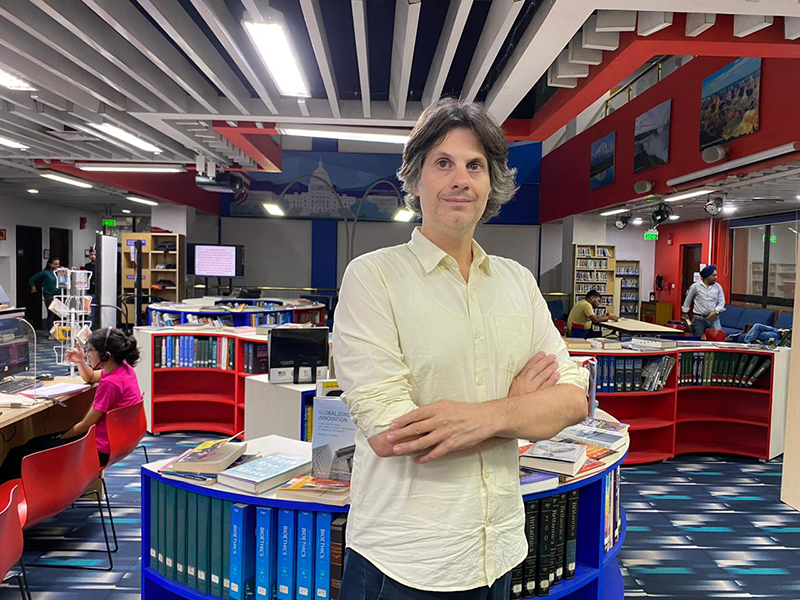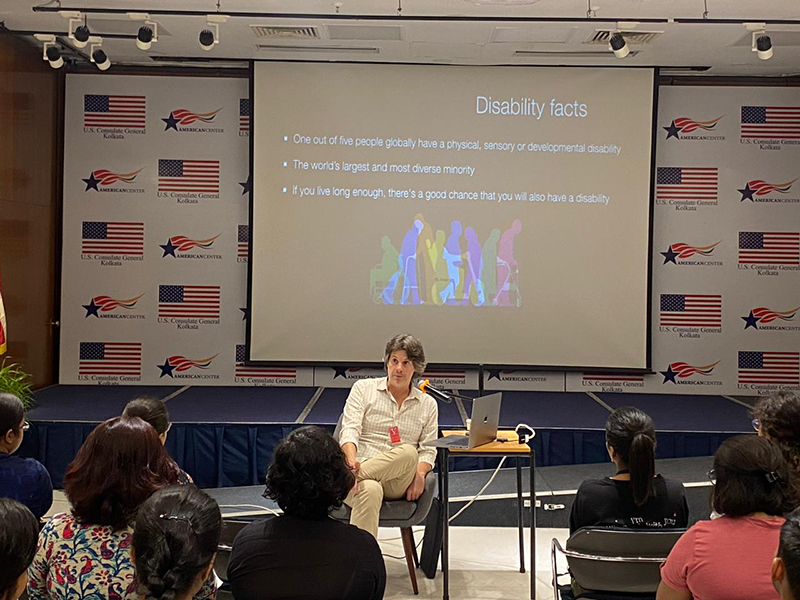 Jason Strother
Jason Strother
Odisha has impressed me with its handling of climate change effect on the people with disabilities: US journalist Jason Strother
Multimedia journalist, educator, Fulbright scholar, and founder of Lens15 Media, Jason Strother, visited Kolkata recently to conduct a workshop on the topic of 'Disability Representation In Mass Media, Reporting On Disability And Making Media More Accessible For People With Visual Disabilities' at the American Center. In a conversation with IBNS correspondent Supriyo Hazra, he talked about climate change, disability journalism and more. Excerpts:
What does your project deal with?
Earlier this year, I began a project that was supported by a grant from the US Fulbright Commission. I have spent three months in Bhubaneswar, and two months in Maldives and Sri Lanka. I am looking at the ways climate change is affecting people with disabilities and how disaster management includes or does not include people with disabilities in planning and protocol systems.
What kind of challenges are faced by disabled people in countries like India or in other nations?
Surely, people with disabilities are facing challenges across the world. They are arguably the most impacted population due to climate change. When a disaster hits an area it is these people who are more likely to be disconnected from their loved ones, caregivers, and even their assistive devices like a wheelchair. They also lose their lives as their loved ones sometimes leave them behind accidentally when a disaster strikes a region. Even, in certain situations, they cannot reach a relief shelter due to lack of accessibility. They may even find the warning system in an inaccessible format. The recovery for these people may even take a longer time, whether it is financial or infrastructure development.
Do you think that journalists are trying to raise the issue of disabled people?
Very little attention has been given to this topic by journalists, across various media platforms. Disability advocacy organizations have been pointing to these issues for years but the media, governments, and even international organizations have not put it properly on the table.
In your journey so far, which country do you find is working properly on the issue of disabled people as far as climate change is concerned?
The situation and the way the matter is being tackled in Odisha has really impressed me. There has been a conversation going on in Odisha to give priority to people with disabilities during and after a disaster takes place. Frankly speaking, I have not seen such an initiative being taken in any of the countries I have covered so far. In New Jersey, which is my home state, I don't think there is much awareness about safely sheltering or evacuating marginalised communities as I have seen in Odisha. Perhaps, one of the major reasons behind this is the fact that Odisha as a state is vulnerable to the effects of climate change. Everyone in the state, regardless of their ability level, is experiencing climate change in one way or the other. The state is proactive in terms of its disaster planning and management. Moreover, I think with the support of some organizations, disabled people have also been added to the planning process.

What are the challenges you feel the world is expected to see due to climate change in the next five years?
You can see one thing in recent times: sea levels and even world temperatures are rising and a lot of such activities could be seen around the Indian Ocean and the Bay of Bengal region. This is perhaps one of the reasons why I wanted to do the research around South Asia as this part of the world is rapidly changing due to climate change. Everyone is experiencing the effects of climate change in his way in this region.
Do you think that increasing awareness about climate change and disability is a proper way forward to tackle the crisis?
Increasing awareness through education and even the role of media plays a crucial role in tackling these issues. Journalists should play a better role by focusing on big news events like climate change and even on disability reporting and this will surely create more awareness across the board. Hopefully, it will help in highlighting the problems of disabled people during climate change and crisis situations.
Do you think joint workshops between students from the USA and India will help in creating more awareness about climate change and disability reporting?
I think America will greatly benefit from hearing stories from students in India as many people in the USA still believe that climate change is not real. There are areas in the USA where people believe that climate change is a hoax. Perhaps, it is part of some political agenda. I think that has affected the education system in certain regions as well. So, if American students can hear from people who are facing the impact of climate change then that will benefit everyone.
What message do you want to convey to people with your documentary?
The ways in which climate change is affecting disabled people is absolutely underreported and even under examined and there could be more awareness of it. I feel people with disabilities could have been kept more safely during disasters if more people with disabilities were at the table as far as disaster management protocol drafting, discussion on training and other measures were taken.
Support Our Journalism
We cannot do without you.. your contribution supports unbiased journalism
IBNS is not driven by any ism- not wokeism, not racism, not skewed secularism, not hyper right-wing or left liberal ideals, nor by any hardline religious beliefs or hyper nationalism. We want to serve you good old objective news, as they are. We do not judge or preach. We let people decide for themselves. We only try to present factual and well-sourced news.







